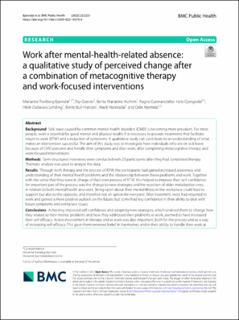| dc.contributor.author | Bjørndal, Marianne Tranberg | |
| dc.contributor.author | Giæver, Fay | |
| dc.contributor.author | Aschim, Bente Marianne | |
| dc.contributor.author | Gjengedal, Ragne Gunnarsdatter Hole | |
| dc.contributor.author | Lending, Hilde Dallavara | |
| dc.contributor.author | Bull-Hansen, Bente | |
| dc.contributor.author | Hannisdal, Marit | |
| dc.contributor.author | Hjemdal, Odin | |
| dc.date.accessioned | 2023-01-17T10:03:15Z | |
| dc.date.available | 2023-01-17T10:03:15Z | |
| dc.date.created | 2022-12-08T09:08:48Z | |
| dc.date.issued | 2022 | |
| dc.identifier.citation | BMC Public Health. 2022, 22 (1), . | en_US |
| dc.identifier.issn | 1471-2458 | |
| dc.identifier.uri | https://hdl.handle.net/11250/3043916 | |
| dc.description.abstract | Background
Sick leave caused by common mental health disorders (CMD) is becoming more prevalent. For most people, work is essential for good mental and physical health. It is necessary to provide treatments that facilitate return to work (RTW) and a reduction of symptoms. A qualitative study can contribute to an understanding of what makes an intervention successful. The aim of this study was to investigate how individuals who are on sick leave because of CMD perceive and handle their symptoms and their work, after completing metacognitive therapy and work-focused interventions.
Methods
Semi-structured interviews were conducted with 23 participants after they had completed therapy. Thematic analysis was used to analyse the data.
Results
Through both therapy and the process of RTW, the participants had gained increased awareness and understanding of their mental health problems and the relationship between those problems and work. Together with the sense that they were in charge of their own process of RTW, this helped to improve their self-confidence. An important part of the process was the change to new strategies and the rejection of older maladaptive ones, in relation to both mental health and work. Being open about their mental illness in the workplace could lead to support but also to the opposite, and therefore not an option for everyone. After treatment, most had returned to work and gained a more positive outlook on the future, but some had less confidence in their ability to deal with future symptoms and workplace issues.
Conclusions
Achieving improved self-confidence and adopting new strategies, which enabled them to change how they related to their mental problems and how they addressed their problems at work, seemed to have increased their self-efficacy. Active involvement in therapy and at work was also important, both for the process and as a way of increasing self-efficacy. This gave them renewed belief in themselves and in their ability to handle their work at present and in the future. Despite this being a manualized treatment, the participants’ experience was that it was adapted to each individual, something they regarded as important. | en_US |
| dc.language.iso | eng | en_US |
| dc.publisher | BMC | en_US |
| dc.rights | Navngivelse 4.0 Internasjonal | * |
| dc.rights.uri | http://creativecommons.org/licenses/by/4.0/deed.no | * |
| dc.title | Work after mental-health-related absence: a qualitative study of perceived change after a combination of metacognitive therapy and work-focused interventions | en_US |
| dc.title.alternative | Work after mental-health-related absence: a qualitative study of perceived change after a combination of metacognitive therapy and work-focused interventions | en_US |
| dc.type | Peer reviewed | en_US |
| dc.type | Journal article | en_US |
| dc.description.version | publishedVersion | en_US |
| dc.source.pagenumber | 12 | en_US |
| dc.source.volume | 22 | en_US |
| dc.source.journal | BMC Public Health | en_US |
| dc.source.issue | 1 | en_US |
| dc.identifier.doi | 10.1186/s12889-022-14378-0 | |
| dc.identifier.cristin | 2090441 | |
| cristin.ispublished | true | |
| cristin.fulltext | original | |
| cristin.qualitycode | 1 | |

